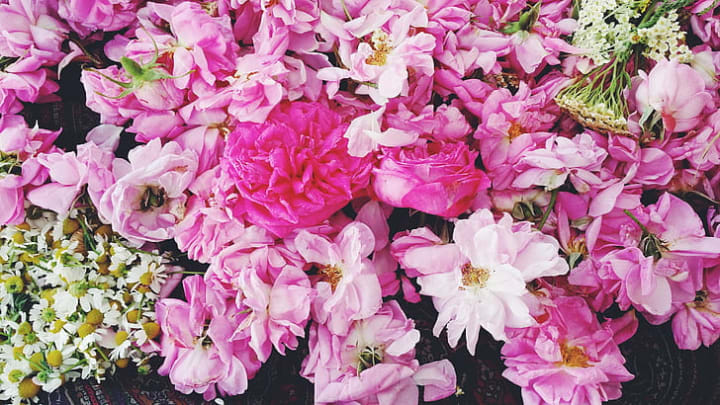
Bulgarian rose, scientifically known as Rosa damascena, is a species of rose that is renowned for producing one of the most prized and sought-after essential oils in the world—Bulgarian rose oil. Here are some key aspects of the Bulgarian rose:
Origin and Cultivation:
The cultivation of the Bulgarian rose, specifically the damask rose variety, has a rich history dating back to the 7th century. Originally from the Middle East, these roses found their way to Bulgaria, particularly in the region known as the Rose Valley.
Bulgaria is recognized as one of the major producers of high-quality rose oil globally, owing to its specific climate conditions and soil characteristics.
Climate and Terroir:
The climate in Bulgaria's Rose Valley is characterized by cool temperatures and humidity, which contribute to the unique characteristics of Bulgarian roses.
Unlike other rose-growing regions, the cooler spring temperatures prevent the formation of a protective wax on the rose petals, allowing for higher oil saturation.

Distinctive Fragrance:
Bulgarian rose is known for its complex and multifaceted fragrance profile. The essential oil extracted from these roses is prized for its rich, floral aroma with notes of citrus, fruitiness, and green freshness.
The damask rose variety cultivated in Bulgaria is particularly valued for its unique scent, making it a preferred choice for perfumers around the world.
Extraction Process:
The process of extracting Bulgarian rose oil is labor-intensive and time-sensitive. Harvesters carefully handpick the roses during a specific window of time, usually lasting a few weeks each year.
The freshly harvested roses are immediately subjected to distillation to ensure the preservation of their volatile compounds and the extraction of the highest-quality oil.

Global Demand:
Bulgarian rose oil is highly sought-after in the fragrance and cosmetic industries. Renowned luxury brands, including Tom Ford and Louis Vuitton, often incorporate this precious oil into their high-end perfumes and skincare products.
The global demand for Bulgarian rose oil continues to grow, with the market witnessing a significant expansion, especially in the organic rose oil segment.
Symbolism and Luxury:
Bulgarian rose oil is often associated with sophistication, romance, and luxury. Its inclusion in perfumes adds a touch of elegance and uniqueness to fragrances.
Despite its high price tag, the oil's unique scent profile and the labor-intensive extraction process make it a symbol of timeless allure and exclusivity.

Bulgarian rose oil
In the enchanting landscapes of Bulgaria's Rose Valley, a labor-intensive and time-sensitive process unfolds to extract the precious Bulgarian rose oil, a coveted ingredient in the world of luxury perfumes. Harvesters, like Fegan, navigate the delicate window of opportunity, collecting thousands of damask roses before they wilt and lose their valuable oil content.
The demand for Bulgarian rose oil is driven by its unique and complex fragrance profile, which encompasses citrusy, fruity, and green notes. Brands such as Tom Ford and Louis Vuitton eagerly seek their share of this fragrant treasure, despite the challenges faced by harvesters who have only a few weeks each year to gather the 450 tons of roses required.
The meticulous process continues at The Distillery, where the freshly harvested roses undergo immediate distillation to preserve their potency. Master perfumer Kristoff Lamel emphasizes the importance of swift extraction, as delays can diminish the oil's quality and value. The controlled distillation process ensures the highest concentration of rose oil, with every detail meticulously monitored.
The limited oil content in Bulgarian roses makes each kilogram of oil a precious commodity, fetching prices as high as $15,000. Despite the cost, perfumers like Kuen find the unique scent profile of Bulgarian rose oil well worth the investment. Studies reveal over 300 compounds in damask rose oil, distinguishing it as a more complex and desirable fragrance.
Bulgaria's Rose Valley, with its cool and wet climate, plays a crucial role in enhancing the oil's richness. Factors such as delayed seasons, unexpected rainfall, and cooler temperatures contribute to the unique characteristics of Bulgarian roses. The demand for this fragrant treasure continues to rise globally, with the rose oil market projected to grow at a compound annual rate of 6.8%.
As the scent of Bulgarian rose oil becomes an integral note in perfumery, the industry anticipates its continued growth. Perfumers like Kristoff Lamel express the versatility of this fragrance, noting its ability to enhance and elevate a wide range of perfumes. In the world of luxury, Bulgarian rose oil remains a symbol of sophistication and timeless allure.
Bulgarian rose stands as a symbol of aromatic excellence, with its unique fragrance and the laborious process involved in its cultivation and extraction making it a prized and cherished commodity in the world of perfumery and luxury cosmetics.
About the Creator
Arthy Raj
TAKE IT LITE, AND WALK OFF FROM THAT PATH.





Comments
There are no comments for this story
Be the first to respond and start the conversation.